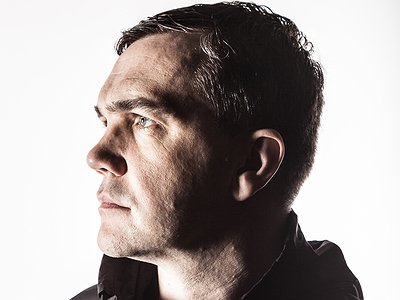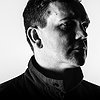Name: Alistair Wells
Occupation: Producer / DJ
Current Release: Bitter Music on Perc Trax
Musical Recommendations: Francis Bacon's Velazquez inspired series of Pope paintings are (to me) a complete artist at work. Pursuing his own path, experimenting, rejecting, experimenting again and moving forward.
Vapourspace's remixes of Todd Levin on Deutsche Grammophon from 1995 have really connected with me recently. Vocal, electronic reworks that stem from an orchestral original, they demonstrate a subtlety and lightness of touch which is so rare these days.
If you enjoyed this interview with Perc, visit his Facebook profile or bandcamp page for more information and updates.
When did you start writing/producing music - and what or who were your early passions and influences? What is about music and/or sound that drew you to it?
I was in my first band when I was 12 or 13 but I started producing electronic music on my own from the age of 16. My early musical loves were things like hip-hop and heavy metal, though the more commercial side of both. My gateway into dance music was hardcore and rave that I heard on the radio in the UK and from that I discovered techno and some of the early Warp and Rephlex releases. After the compromise of being in bands I liked the way I had 100% control when I produced music on my own. I could learn and develop at my own pace and make my own mistakes in my own time.
For most artists, originality is first preceded by a phase of learning and, often, emulating others. What was this like for you? How would you describe your own development as an artist and the transition towards your own voice? What is the relationship between copying, learning and your own creativity?
I started producing in a pre-laptop, pre-in the box era, so even if I wanted to sound like my early heroes such as the Prodigy or Shut Up And Dance I could not because I could not afford a sampler. I was trying to programme breakbeats on a Roland TR-626 drum machine, running it through a cheap DOD distortion pedal to make it sound rougher. Slowly I found my own sound and tried to add new equipment to push my music forward and not just to sound like others. Genre exercises where you attempt to learn the methods used in a particular style of music can be fun and can help you learn but generally I am against emulating the sound of an artist you love. No one needs another copy of Jeff Mills or Regis or Mike Parker. Strive to be the best version of yourself rather than an inferior copy of an established artist.
What were your main compositional- and production-challenges in the beginning and how have they changed over time?
Lack of equipment mainly but at least that made me learn my machines inside out, far better than I know a lot of my equipment now. Now I have much more hardware plus a computer packed with production options so the question has changed. Now it is how do I choose from the huge range of options in front of me and how do I use them to create something that excites me and feels fresh and new to me? I'd rather take a chance on a track and fail publicly than make endless copies of my more popular tracks.
What was your first studio like? How and for what reasons has your set-up evolved over the years and what are currently some of the most important pieces of gear for you?
As I mentioned earlier it was a Roland TR-626 drum machine and about 3 or 4 Boss and DOD pedals, an analogue echo unit by Maplins which I still have and which still sounds amazing and some 19" rackmount effects by ART and Zoom. I also had the family's trusty Casio keyboard that I did everything I could to mess the sound up of. Back then I was sequencing using Voyetra's SP1 sequencer, which was MIDI only, no audio. Tracks would be mixed down through a small Soundcraft mixer and recorded to cassette and then later to CDR. Since then I've had more powerful samplers and synths come and go from my studio but my collection of effects pedals continues to grow and grow. Right now I am about 50% in the box and 50% hardware. Key machines for me are my Elektron Analog Rytm, Waldorf Pulse 2. Korg Monologue and my Jomox and Vermona drum modules.
How do you make use of technology? In terms of the feedback mechanism between technology and creativity, what do humans excel at, what do machines excel at?
I do not idolise technology or get caught in that mental trap of fooling myself into thinking that I can't make worthwhile music until I have a certain piece of equipment. Machines are tools which can occasionally inspire, but for now they can't replace humans.
Production tools, from instruments to complex software environments, contribute to the compositional process. How does this manifest itself in your work? Can you describe the co-authorship between yourself and your tools?
Everything is made by me from scratch. It might not be exactly what I set out to make at the start of the session but it still came from me somehow. I use Max For Live a little but I've never got too deep into creating my own devices with it and neither do I use Reaktor or any digital modular systems. I am not a complete novice with technology but I would not describe myself as a power user either.
Collaborations can take on many forms. What role do they play in your approach and what are your preferred ways of engaging with other creatives through, for example, file sharing, jamming or just talking about ideas?
I like collaborating but over the years I've realised it works a lot better with someone I already know personally (like Truss or Randomer) and who already have respect for their music. I prefer being in the same room and jamming rather than file sharing and internet based collaborative projects. I learn a lot from every successful collaboration I complete but I also really enjoy being in the studio on my own and steering a project in exactly the direction I want it to go in.
Could you take us through a day in your life, from a possible morning routine through to your work? Do you have a fixed schedule? How do music and other aspects of your life feed back into each other - do you separate them or instead try to make them blend seamlessly?
There is no fixed schedule though often I do Perc Trax label work and administrative tasks in the morning, then go out in the afternoon and then work in the studio at night. I am often doing three things at once rather than assigning blocks of time to work on the different areas of what I do. Everything is connected for me. Doing something like preparing the orders thant have come in via Bandcamp clears my mind to do something creative later in the day.



